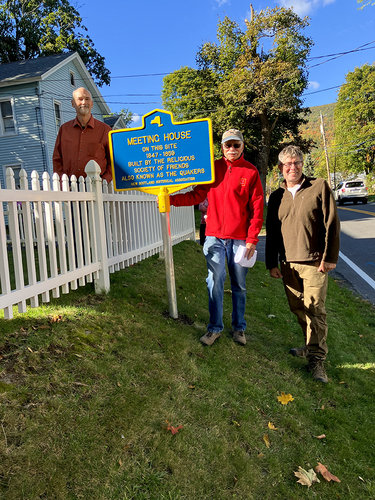Initials on a map lead to Quaker meeting house marker
— Photo from Judy Kimes
Standing next to New Scotland Road, across from the old Dutch Reformed Church in New Salem, homeowner Bryan Smith, left; Alan Kowlowitz, president of the New Scotland Historical Association, center; and NSHA Historic Sites Chairman Chris Albright dedicate a new marker, denoting the site of a meeting house for the Religious Society of Friends.
To the Editor:
On Oct. 12, the New Scotland Historical Association dedicated a historical marker commemorating the New Salem Quaker Meeting House that stood on Route 85 in New Salem and served as a meeting house from 1847 until 1859. It was during this time period that Quakers were in the forefront of most reform movements, including the abolition of slavery and women’s rights.
The Quaker community that established and used this meeting house consisted of a group of families related by marriage or descent who lived in the New Salem/New Scotland area. They included the Woods, Moores, Bennetts, Rushmores, and Bradts — names that are still familiar to those living in the New Scotland area.
The New Scotland Historical Association wishes to thank Chris Albright, NSHA’s Historical Marker chairman, who did the research and oversaw the placing of this marker.
It was while studying an old map that Mr. Albright noticed the initials “Q. M.” at this site in New Salem. This led him to conduct further research, resulting in the discovery of documentation describing the steps leading to the establishing of this meeting house.
NSHA also thanks Bryan Smith for allowing NSHA to place the marker on his property. This marker was funded through the support of NSHA’s members.
By erecting this marker, this site is recognized as well as the historic character of New Salem, one of the oldest settlements in the town of New Scotland.
Judy Kimes
Publicist
New Scotland
Historical Association
